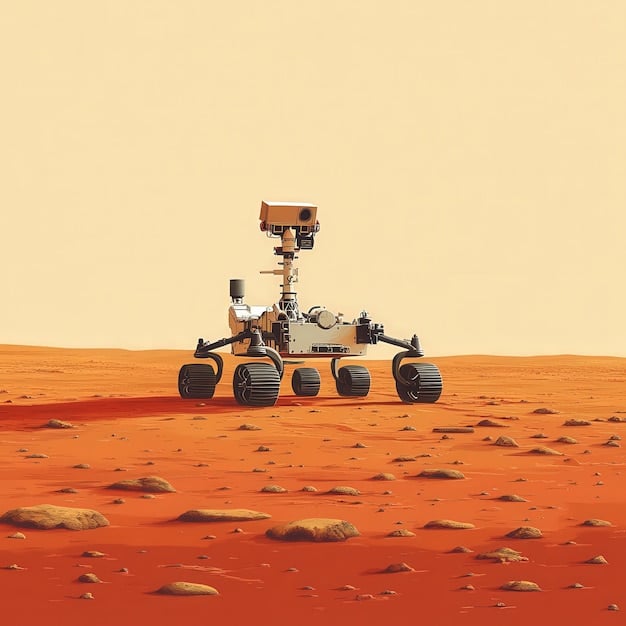Implications of Increased Space Science Funding in the 2025 US Budget

What are the implications of the 15% increase in funding for space science research in the 2025 US budget? This boost is expected to accelerate research, drive technological innovation, and expand our understanding of the universe, while also stimulating economic growth and inspiring future STEM professionals.
The United States has long been a leader in space exploration and scientific discovery. As we look ahead to 2025, a significant development promises to shape the future of space science: a proposed 15% increase in funding for space science research in the US budget. But what are the implications of the 15% increase in funding for space science research in the 2025 US budget?
This substantial boost in investment raises exciting possibilities and transformative changes in the field. Let’s delve into what this increase means for the future of space exploration.
Understanding the 15% Funding Increase for Space Science
The proposed 15% increase in funding marks a pivotal moment for space science in the United States. It signifies a renewed commitment to expanding our knowledge of the cosmos and pushing the boundaries of technological innovation. Here’s a detailed look at what this increase entails.
What Does the Funding Include?
The increased funding is allocated across various projects and initiatives within space science, covering a broad spectrum of research areas. These may include:
- Advanced telescope projects for deeper space observation.
- Robotic missions to explore other planets and moons.
- Research into astrophysics, cosmology, and planetary science.
- Development of new technologies for space travel and exploration.
Why is This Increase Significant?
A 15% increase in funding is substantial, especially when considering the already significant investments in space science. This boost can accelerate ongoing projects, initiate new research endeavors, and support the development of cutting-edge technologies. What are the implications of the 15% increase in funding for space science research in the 2025 US budget? It could be a game changer.
Space science research is a long-term investment with benefits ranging from groundbreaking discoveries to technological spin-offs. It’s also inspiring to future generations.

Accelerating Space Exploration Initiatives
One of the most immediate impacts of the funding increase is the acceleration of existing and planned space exploration initiatives. This could translate into faster timelines, more ambitious goals, and broader scopes for various missions.
These current initiatives gaining more funding might include:
- Advancing the Artemis program to return humans to the Moon.
- Developing new spacecraft and propulsion systems.
- Supporting the James Webb Space Telescope for continued astronomical discoveries.
Advancements in Technology
The injection of funds will spur technological advancements necessary for more ambitious exploration initiatives. This includes investing into:
- More efficient rocket engines and propulsion systems.
- Autonomous systems for rovers and spacecraft.
- Advanced materials for spacecraft construction.
These advancements could reduce the cost of space missions, making them more frequent and accessible. The increased funding will contribute to the cutting edge technology that propels space exploration forward.
Scientific Discoveries and Knowledge Expansion
The primary goal of space science is to expand our understanding of the universe. A 15% increase in funding provides researchers with more resources to pursue this goal, leading to potential breakthroughs and discoveries, such as:
- Finding New Exoplanets: Discovering planets beyond our solar system and assessing their potential for habitability.
- Studying Dark Matter and Energy: Unraveling the mysteries of these phenomena that make up most of the universe.
- Understanding the Formation of the Universe: Gaining insights into the origins and evolution of cosmic structures.
A Broader Perspective
Space science enhances our understanding of Earth’s place in the cosmos. New discoveries can change our ways of thinking with greater technology and research, we have the ability to find other planets and to understand how cosmic structure impacts life on our planet.
Increased funding may also allow for more comprehensive studies of climate change, disaster monitoring, and resource management, contributing to a more sustainable future. What are the implications of the 15% increase in funding for space science research in the 2025 US budget? It can change lives on this planet as well.

Economic and Societal Benefits
Beyond scientific discoveries, increased funding for space science can have significant economic and societal benefits. Investment in space exploration often translates into job creation, technological spin-offs, and enhanced international cooperation.
Job Creation and Economic Growth
The space industry is a major employer, and increased funding can lead to the creation of new jobs in engineering, research, manufacturing, and related fields. The boost in the space sector can stimulate economic growth, benefiting both local and national economies.
Space technologies developed for exploration often find applications in other sectors, such as medicine, telecommunications, and materials science. These spin-off technologies can improve the quality of life and drive innovation across various industries. What are the implications of the 15% increase in funding for space science research in the 2025 US budget? A better future for many.
Inspiring Future Generations
Space exploration has a unique ability to capture the imagination of people of all ages. Investing in space science can inspire future generations to pursue careers in science, technology, engineering, and mathematics (STEM) fields. This inspiration improves the overall education and training of our workforce creating a brighter future.
Educational Opportunities
Increased funding may also support educational programs aimed at promoting STEM education. These programs can engage students in hands-on activities, providing them invaluable skills and experience.
The allure of space can encourage students to pursue higher education and careers in scientific disciplines, contributing to a more skilled workforce and technological advancement. The knowledge is passed on and improved upon.
Challenges and Considerations
While the 15% increase in funding presents numerous opportunities, it also comes with challenges and considerations. These include the need for careful resource allocation, international collaboration, and addressing the ethical implications of space exploration. The most important consideration is resource allocation.
Ethical Implications
As space exploration progresses, ethical considerations become increasingly important. These include protecting potentially habitable environments from contamination, respecting the interests of all nations, and ensuring the responsible use of space resources. What are the implications of the 15% increase in funding for space science research in the 2025 US budget? It is about more than funding.
| Key Point | Brief Description |
|---|---|
| 🚀 Exploration Boost | Faster timelines for Lunar and Mars missions. |
| 🔭 Scientific Discovery | More studies on exoplanets, black holes, and the universe’s formation. |
| 💰 Economic Impact | Creates jobs and technological advancements. |
| 🌟 Inspiring Future Generations | Motiviation for students in STEM fields. |
Frequently Asked Questions
The funding is likely to be distributed amongst telescope projects, robotic missions, astrophysics, and new space travel technologies. All of this will help to discover more about what are the implications of the 15% increase in funding for space science research in the 2025 US budget.
Increased funding will allow for more robust international partnerships, enabling countries to collaborate on ambitious projects, share resources, and combine expertise for greater scientific achievements. It broadens the scope of the future of space exploration.
The increase can stimulate economic growth by creating jobs in space exploration. Investing in space exploration often translates into job creation, technological spin-offs, and enhanced international cooperation which allows many fields to learn, profit, and benefit from what are the implications of the 15% increase in funding for space science research in the 2025 US budget.
The funds can invest into educational programs aimed at promoting STEM education. These programs can engage students in hands-on activities, giving them new skills and experiences, furthering their education.
Public engagement is vital as it helps to foster support for long-term funding. Through effective communication, the public can learn the importance of technology and how exploration impacts jobs, what are the implications of the 15% increase in funding for space science research in the 2025 US budget and the potential benefits for generations.
Conclusion
In conclusion, the proposed 15% increase in funding for space science research in the 2025 US budget has far-reaching implications. These exciting initiatives span from accelerating exploration initiatives to expanding scientific discoveries and inspiring future generations.





